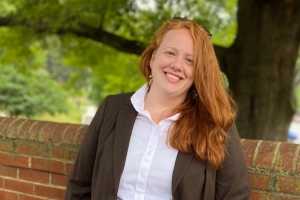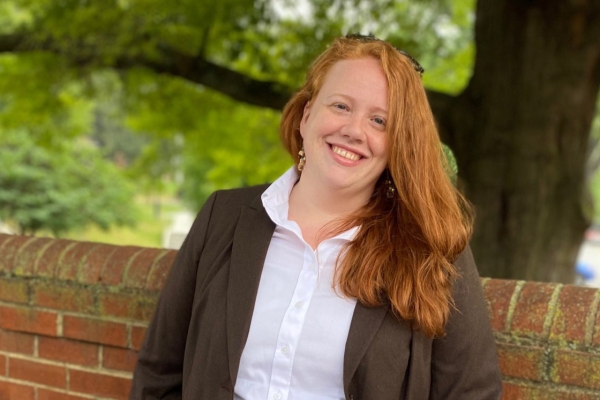
Faculty Profile: Alex Klein Alex Klein, who rejoined W&L Law as an assistant professor this year, teaches and writes in the fields of capital punishment, criminal law, and criminal procedure.
Alex Klein joined the faculty of W&L Law in the fall of 2024 as an assistant professor of law. A 2016 graduate of the law school, Klein previously served as a visiting assistant professor at W&L before spending two years on the faculty of St. Mary’s University School of Law in Texas. Klein teaches and researches in the fields of capital punishment, criminal law, and criminal procedure.
Klein’s journey to legal academia began in a rather unconventional way. As an undergraduate in the well-known fine arts program at Virginia Commonwealth University, she majored in costume design. “Costume design is interesting because it’s very research-heavy,” Klein explains. “We’re looking at how people dressed, what they wore, and what they did back then. Those research skills have actually come in handy in my work in academia.”
The first inkling that teaching might be in Klein’s future came during her service in the Peace Corps from 2008 to 2010, where she taught health education in the Republic of Moldova. When she returned to the U.S., Klein worked in youth education and juvenile detention programs in Virginia, teaching teen pregnancy prevention and health education. It was during this time that her interests began to shift toward advocacy and law. Her mother suggested that her interests aligned more with legal advocacy than direct service. Meanwhile, her father, who had attended law school at St. John’s University, encouraged her to consider the path herself.
Klein was skeptical. “I had said for years that I never, ever would be a lawyer,” she admits. “I had friends thinking about law school, and I was like, ‘Oh my gosh, I could never do that. I hate arguing.’” But as it turns out, Klein loved law school more than she ever thought possible. In fact, her biggest challenge at the outset was that she loved all of it.
“I ran into the fundamental problem of everything being interesting,” she said. “Even the subjects I thought I’d hate. It turns out I actually do love arguing, but only about the law.”
An internship after her 1L year with the Virginia Capital Representation Resource Center turned out to be pivotal in defining her academic focus. There, she worked on capital cases at the appellate level and was engaged in mitigation work. This was followed with a stint in the Virginia Capital Case Clearinghouse, W&L Law’s capital defense clinic, which ceased operation in 2021 after Virginia abolished the death penalty. A clinic research project exposed her to the state law surrounding methods of execution, and she was astonished by the lack of regulation and government oversight.
“Killing someone is the height of state power,” says Klein. “It’s when the state exercises the most authority that it has, and the law just kind of dropped out. I found that really strange, and I became fascinated with working in this area.”
After graduating from W&L Law at the top of her class, Klein held two clerkships—one at the Maryland Supreme Court and another at the U.S. Court of Appeals for the Sixth Circuit. The mentorship she received during her clerkships impressed on Klein the power of thoughtful legal reasoning.
“My judge in Maryland, who had served at every level of the judiciary, was incredible. She truly cared about getting decisions right, making sure they were well-reasoned and well-written,” Klein says. Her Sixth Circuit clerkship provided additional valuable experiences, allowing her to sit in on cases across multiple circuits. One of her judges suggested Klein consider law teaching.
“We were going through a draft opinion, and my judge said, ‘Alex, have you ever thought about academia? You use a lot of footnotes,’” Klein recalled. “She had a valid point.” When an opportunity arose to return to W&L Law after her second clerkship as a visiting assistant professor, Klein jumped at the chance. “If someone offers you a shot at your dream job, you take it,” she says.
Now in her sixth year of teaching, Klein focuses her research and teaching on capital punishment and criminal law. Her scholarship has appeared in the Pepperdine Law Review, the Ohio State Law Journal, the Florida Law Review, the University of Detroit Mercy Law Review, the Nevada Law Journal, and the Northeastern University Law Review. She has written about firing squads, bodily autonomy and methods of execution, and the future of the Eighth Amendment. Despite the heavy nature of her work, Klein’s sense of humor remains intact. “A colleague once told me, ‘You seem like such a happy person to research executions,’” she laughs. “My husband says being married to me is like being married to Wednesday Addams.”
But for Klein, the weight of her research is matched by its importance. “This is the ultimate exercise of state power. It’s supposedly done in our names. And yet, we accept a level of secrecy and dysfunction that would be unthinkable in any other area of government,” she says. “That’s why I keep studying it.”
 Professor Alex Klein
Professor Alex Klein
You must be logged in to post a comment.